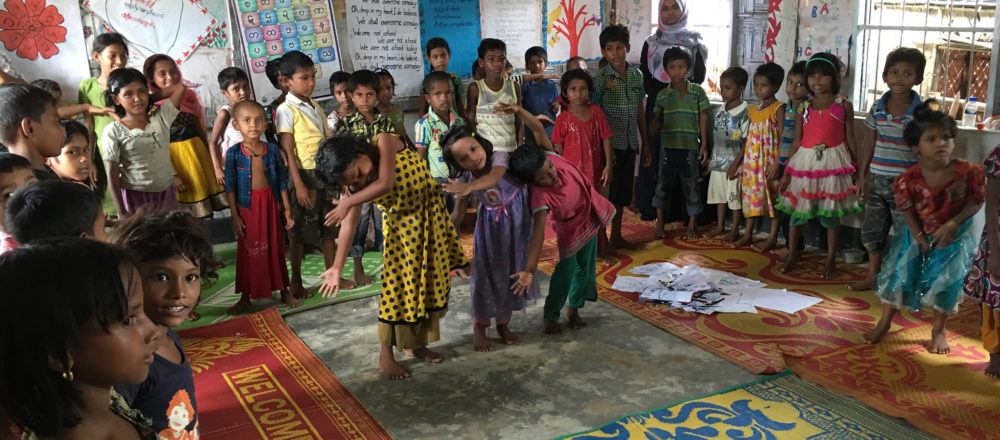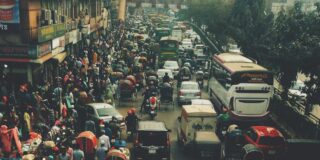When Azida* and her eight children, the youngest still jostling in her womb, fled their village in Myanmar last year, the gunfire was cracking at their heels. According to Azida, tears of fear streamed down their faces, for the journey ahead was almost as treacherous as the military brutality they were leaving behind.
Azida’s unborn child did not survive the arduous march from Rakhine State to Cox’s Bazar in Bangladesh but her seven other children, and eventually her husband, did. For the past 15 months, the family, along with almost one million other Rohingya refugees, have found a respite of sorts in the sprawling camps of Cox’s Bazar.
That was until last month, when Azida and her husband received the confounding news that they – along with 2,260 selected individuals – had been placed on a repatriation list jointly decided upon by the governments of Bangladesh and Myanmar.
Although the planned repatriation did not take place, the thought of returning with her young family to the terror they only narrowly escaped filled Azida with dread.
“How can I go back to this situation where they shoot us?” she asked World Vision staff recently.
“I am hiding my daughters… [they] can be assaulted if we go back. They can be harassed, and we would not be able to do anything. That is why we came here. I am afraid. I cannot eat. We do not want to go back.”
Azida desperately wants to return to her home in Myanmar, but not until conditions are safe there and her people are guaranteed rights to citizenship, education, and freedom of movement, among others. Thankfully, the government of Bangladesh stood by its commitment not to return the Rohingya against their wills, and until such time that conditions in Myanmar are safe. But the fear of being returned still lingers.
Even before the fear of repatriation, children such as Azida’s were scared and suffering, and still are, after more than a year living in an overcrowded refugee camp. Every day these children live with the knowledge that kidnappers might abduct them if they go to the market alone. Frequently they tell us how much they miss their old lives, their schools and their homes back in Myanmar.
UNHCR surveyed these children, who have fled unimaginable brutality, most of them washed in terror from their homes by a wave of mass killings, torture, and rape as their villages were burned. That survey shows nearly four in five girls still fear sexual assault or being kidnapped. More than three quarters of boys are worried about kidnapping or community violence.
But enduring hardships in squalid camp conditions is still better than the prospect of returning to the terror at home. The United Nations has declared the brutal military campaign against the Rohingya minority in Myanmar to be genocide. UN investigators report that the violence continues against those who remain behind.
Today is Human Rights Day. On this day 70 years ago, the United Nations General Assembly adopted the Universal Declaration of Human Rights. It was borne of the idea that the international community would never again stand by and allow barbarities like the genocide perpetrated against the Jews.
Yet 70 years on the rights of the Rohingya – people who identify themselves by their ethnicity and their Muslim religion – continue to be violated, as they have been for decades.
Children make up more than half of the 920,000 refugees living in the camps. They tell us they are desperate to go to school. Education is a right of every child, but most of the child refugees in Cox’s Bazar don’t have access to formal schooling and so can’t equip themselves for future opportunities.
World Vision runs 12 child-friendly spaces providing a safe place for up to 1,300 children each week. These places are important, but they’re nowhere near enough.
On a visit to Cox’s Bazar earlier this year, I met so many bright kids. Their appetite for learning reinforced how important education is for children who have lost everything. The children of Cox’s Bazar desperately need the Bangladeshi government to be supported in providing access to high-quality, relevant education in the camps.
Fearing for their safety, living in cramped tents made from bamboo and tarpaulins, the Rohingya still don’t want to go home until conditions are safe and their human rights are recognized. As miserable as the conditions can be, as unsafe as they often feel, as unschooled as they remain, children and their families still see staying in Cox’s Bazar as their best option.
In Myanmar, the Rohingya were denied citizenship. Severe restrictions limited people’s movement outside their villages, making earning a living and access to services, such as hospitals, extremely difficult. Access to education was also hampered. The Rohingya are still viewed as Bangladeshi immigrants, although they have lived in Myanmar for centuries.
Today, the Rohingya are one of the world’s largest groups of stateless people, and one of the most persecuted minorities. They lack citizenship at home and official refugee status in Bangladesh, which is not a signatory to the 1951 Convention of Refugees. Without the protection that refugee status affords, the Rohingya are particularly vulnerable to exploitation and abuse.
Bangladesh’s generosity in hosting almost one million refugees from Myanmar is commendable (about 200,000 arrived in the 1990s due to previous conflicts). But the world’s most influential governments must understand that Bangladesh can’t do this alone. The Australian government, as a leader in the region, should lend greater support and advocate for the rights of the Rohingya.
Granted, our own record of refugee treatment is poor. Detaining refugee children on the island of Nauru for five years is a clear breach of human rights. Adults remain on Nauru and Manus, an unsolved humanitarian crisis still to be removed from the political board game. But the tide of public opinion is changing and our politicians know this, as Australians are demanding more of our government when it comes to protecting the most vulnerable, wherever they are in the world.
The Rohingya refugee crisis begs the question: how are countries like Australia supporting or failing to support other countries like Bangladesh in upholding the rights of the most vulnerable?
As a regional leader, we have a responsibility to do more to ensure the rights of refugees living in limbo in Cox’s Bazar are supported. I, among many in our sector, call on the Federal Government to urgently develop a holistic strategy with multi-year funding to provide life-sustaining care for the refugees while advocating proactively for their rights.
It was a good start to see our government impose sanctions and travel bans on five top Myanmar military leaders accused of leading human rights violations in Rakhine State last year. Refugees tell us such justice is important to them, but that there is so much more that we need to do.
We must encourage the government of Myanmar to allow free and unrestricted access to Rakhine State for UN and humanitarian agencies, and ensure that any repatriations are safe, voluntary, dignified and sustainable.
Until then, Azida and her family will need the generosity of the international community to stay safe while away from home in Bangladesh, educate her children, and earn a living to feed her family.
*Azida’s name has been changed





